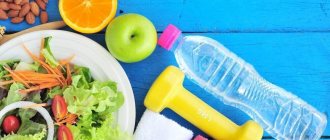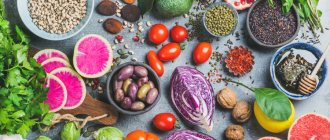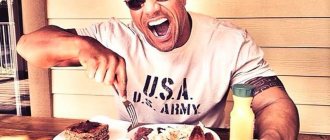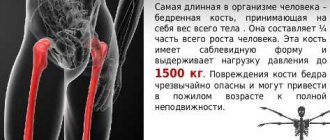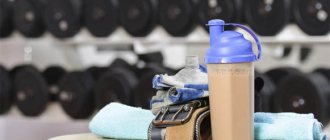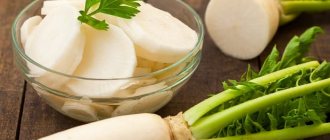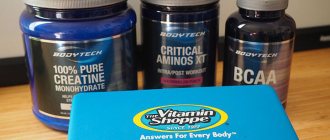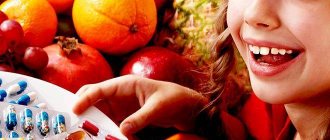How do vegetarian athletes get protein? What are they eating? Let's figure it out together with a nutritionist.
Vegetarianism among athletes is still a controversial topic among nutritionists and nutritionists. Many people believe that in this case it is impossible to engage in many sports or, for example, strength training. However, even among professional athletes there are many who have completely given up meat. Serena and Venus Williams, Lewis Hamilton, Kyrie Irving - and this is not a complete list. So what do vegetarian athletes eat?
Taisiya Prokopenko
nutritionist
Athletes' daily diet should consist of 40% protein. It is mainly found in meat products.
Vegetarianism and sports
Today, more and more people are leaning towards non-traditional food systems. One such system is vegetarianism. Although vegetarians themselves would argue about tradition here. For some, refusing to eat animal food is a philosophy of life, for others they do not eat meat for religious reasons, for others it is possible that they have digestive problems, for others it is due to some of their beliefs. For what reasons do these people refuse meat products is a personal matter for everyone. But in this article, let's try to understand how refusing to eat animal products affects exercise, whether it is possible to combine it, and what needs to be paid more attention to.
I’ll say right away: yes, it’s possible. Moreover, there are many famous vegetarian athletes, and their sporting achievements confirm that giving up meat, fish, and milk does not close the door to big-time sports.
Why should you be careful with plant protein?
Lots of protein - excess of other nutrients
To get the required amount of protein from plant foods, athletes need to eat a lot of these foods. In this way you can get protein, but along with it many other elements come in excess.
Photo: unsplash.com/@maddibazzocco
Digests worse - you have to eat more
In addition, protein from plant foods is absorbed almost twice as poorly as from meat products. Therefore, the norm will have to be calculated differently. If meat eaters need to eat approximately 1.5-1.8 g of protein per kilogram of body weight, then vegetarians need 1.8-2 g or more.
Lots of fiber - few amino acids
Fiber is good for the stomach and gastrointestinal tract. And vegetarians consume a lot of dietary fiber. But it has a special property - it “eats” amino acids. They are absorbed worse and in smaller quantities.
How to replace expensive PP products? 10 available alternatives
What will happen to the body if you drink 2 liters of water every day?
Stages of transition to vegetarianism
If you decide not to eat animal food, then the transition to such a diet should not occur abruptly, but gradually, since any sudden change in the nutritional system is a stressful situation for the body. There are several stages of transition, each of them is also a type of vegetarianism.
1. Exclusion from the diet of red meat. This is the very first and mildest case, since in this case the body still has the opportunity to receive a complete set of proteins, fats, carbohydrates, vitamins, microelements, etc. Adherents of this nutrition option have no problems with gaining weight or building muscles.
2. Refusal of the bird. It’s a little more complicated here, but still, when consuming dairy products, eggs, and fish, we still have the opportunity to get complete protein foods.
3. Exclusion of fish and seafood from the diet. Seafood contains, in particular, a large amount of zinc, which is easily absorbed by the body when consumed. If you exclude their intake, then you need to think about how to compensate for the lack of this microelement. During sports activities, zinc also tends to be excreted from the body. In this situation, various food supplements with microelements will come to the rescue.
4. Elimination of eggs. As you know, the egg is digested almost 100%. This means that the amino acids, microelements, and vitamins contained in it are completely absorbed in the body. It is necessary to carefully select a balanced diet to replenish nutrients.
5. Refusal of dairy products.
All these stages must take place sequentially and over a long period of time. It's better if you stay on each of them for a year, maybe two, maybe more. Try to first listen to your body, understand your condition; perhaps going further to veganism does not make sense and you need to stop at one of the intermediate stages. Moving on to each next stage, you need to think through your diet. Most likely you will have to add products that are new to you that you have not eaten before. Additionally, take vitamin and multimineral complexes and nutritional supplements.
Lacto ovo vegetarian menu for the week. Rational menu for the week
Morning is an important stage, because it is the very beginning of the day. Therefore, food during this period of the day should be very rich. You should start a new day with oatmeal, and be sure to wash it all down with green tea or weak coffee. Oatmeal is an excellent choice for breakfast in all respects. Besides the fact that it is very inexpensive, it is also quick to prepare and contains many nutrients for a good charge for the day. In addition to oatmeal, you can also eat other types of porridge, such as corn or barley. For flavor variety, you can add fruit, because this will not only brighten up your breakfast, but also add a vitamin component.
Lunch is the highlight of the day; refreshment at such a moment is very important for strength for the second half of the day. The vegetarian food menu here must necessarily consist of two dishes. A classic first course should have a liquid component. Ideal here is the preparation of soups and borscht with the addition of vegetables and mushrooms. You can choose a very different side dish, but you should not forget that your stomach should not be full, because this will only cause laziness. Therefore, you need to use light dishes, which are salads. Their variety is very great; here you can add cabbage, radishes, carrots, and apples. It is important to remember that you are not trying to create a heaviness in your stomach, you want to fill up with light food that is also filling.
The working day is approaching sunset, and to wait until dinner, there is an afternoon snack. This is a light snack so you have enough strength to last home. A good choice is a fruit cocktail with the addition of cottage cheese or kefir. If you want to be more satiated, you can prepare apple charlotte or cheesecakes with jam and condensed milk.
To end the day well, you need to prepare a hearty and delicious dinner. A vegetarian dinner menu should also consist of two components. For the first course, stewed potatoes with mushrooms or olives and lemon are perfect; you can also prepare porridge (preferably buckwheat) with eggs. For the second course, you should prepare a light salad of radish or cabbage with an apple or cucumber.
All of the dishes listed above can be combined to create a menu for the week.
By adhering to such a vegetarian menu for the day and week, you can not only eat deliciously, but also maintain the balance of all the necessary substances in the body.
It is worth remembering that each person is an individual person and the approach to each one needs to be purely personal. You shouldn’t eat foods that you don’t like; you can always replace them with ones of the same calorie content. You need to be extremely creative in your nutrition.
What substance deficiencies may occur when switching to vegetarianism?
The biggest mistake when switching to a vegetarian diet is to continue to eat the same foods with the exception of meat foods. If you refuse to eat food of animal origin, you may experience a deficiency of not only amino acids, but also vitamin B12, vitamin D, Omega3 fatty acids, calcium, and magnesium. Their deficiency threatens a decrease in immunity and the development of various inflammatory reactions. We need fiber to properly digest food. With a vegetarian diet, a very large amount of fiber enters the body, but at the same time it not only stimulates digestion, but also absorbs some of the essential amino acids.
What else to pay attention to
In some cases, diet alone is not enough: to maintain adequate nutritional status, it is necessary to take vitamin and mineral complexes.
This is especially true for women during pregnancy and breastfeeding. The older the body, the less efficiently it produces and absorbs vitamin D. Therefore, vegans after 35 years of age need to be more careful when planning their diet and taking vitamin and mineral supplements. When switching to a plant-based diet, you should consider your health status. If a person has certain diseases, avoiding animal products aggravates the situation. As an example, let's look at one of the most common cases. If there is difficulty in the outflow of bile from the gallbladder (kink or deformation of the gallbladder, gallstones), giving up animal products leads to a sharp decrease in the consumption of saturated fats, which, in turn, are food stimulants for the outflow of bile. The result is an overflow of the gallbladder with bile, accompanied by pain and bowel dysfunction. This is why changing your diet requires a thoughtful approach! Our country differs significantly from all other countries in terms of climatic, geographical and climatic conditions, as well as in the range of food supply and genotype of the population. Therefore, it is not possible to extrapolate the experience of other countries to the Russian population without taking into account the country’s characteristics. So far, our country has not accumulated sufficient scientifically generalized experience of vegetarianism and veganism to reasonably assess the prognosis, risks or benefits of these diets. If you decide to change your lifestyle, do not rely on your friends or famous people. Remember that insufficient nutrition can lead to health problems. Contact a nutritionist: he will help you create a diet. Remember that by choosing your diet, you choose the quality and length of your life! Tags:
- Vegetarianism
- Nutrition
- Meat
- veganism
To leave a comment you must be an authorized user
Protein for Vegans
Vegans and vegetarians need protein just as much as any other athlete, and even more. Imagine that even athletes who are not vegetarians are often forced to compensate for the lack of protein with protein sports supplements. But what about vegans? Protein in sports is required to build muscle tissue. Muscles are strength. This means that without protein there will not only be a beautiful appearance, but also outstanding strength indicators. But that’s not so bad, oddly enough. It is even more important that protein is required not only for muscles - it is needed for tendons, joints, blood vessels and skin, because their structural basis is made up of proteins such as collagen and elastin, which are found in sufficient quantities for a physically active person only in animal food. And protein, or more precisely the essential amino acids it contains, is required for the normal functioning of the nervous system and blood renewal. With a lack of complete protein in food, muscle weakness, lethargy occurs, muscle mass and strength decrease, metabolism slows down, irritability appears, the skin becomes flabby, and joints begin to ache.
Where can you find vegan protein? Let's look at what foods contain protein and whether it is enough for an active life.
What does the diet of vegetarian athletes consist of?
Most often, vegetarians eat plant and legume products. Vegetables include: vegetables, fruits, berries. Also popular foods on a plant-based diet:
- dried fruits;
- nuts;
- tofu;
- quinoa;
- cereals;
Photo: unsplash.com/@gbyz13
- sprouted seeds;
- biologically active additives;
- vegetable proteins from hemp;
- rice protein.
Sesame, like other grains, is better to soak, since it is difficult for a person to digest them in their usual form. And sprouted wheat contains many beneficial nutrients. By eating even a little you can get a lot of nutrients.
Sources of protein for vegetarians
How do vegetarians get protein? To compensate for the lack of protein, athletes have to consume large amounts of protein of plant origin, which is absorbed by the body worse than animal protein. Plant protein is found in nuts, legumes, mushrooms, soy, and cereals.
The fact is that plant proteins
a) deficient in amino acid composition - they contain less essential amino acids,
b) contain substances that slow down the absorption of protein - for example, protease inhibitors (an enzyme that breaks down protein).
How can vegetarian athletes avoid protein deficiency? If you have completely excluded foods of animal origin, then you can get the necessary amino acids by eating a combination of cereals and legumes. An even better result is possible if you add nuts here. The best protein foods for vegetarians are soybeans and other legumes (beans, peas, lentils), grains (quinoa, buckwheat, oatmeal, pearl barley), nuts and seeds (peanuts, sunflower seeds, chia seeds, etc.).
Another important component for athletes, which is found in products of animal origin and is practically absent in plant foods, is creatine. It is necessary for gaining muscle mass, for recovery after training, and for increasing endurance. Creatine participates in the body's metabolic processes, strengthens joints and tendons, and improves the functioning of the cardiovascular system. To restore creatine requirements, vegetarians need to take dietary supplements.
What to do with vitamin B12 deficiency? The problem is that this vitamin is found almost exclusively in animal products. We need vitamin B12 for the normal healthy functioning of the nervous system and brain; even a slight deficiency of it leads to cognitive impairment, chronic fatigue, and possibly numbness of the limbs. If it is possible for you to consume eggs, cheese or milk, there is no particular danger. If you adhere to strict vegetarianism, you need to add vitamin supplements to your food.
To avoid a lack of iron, which red meat is rich in, you need to add more spinach and legumes to your diet. Iron is involved in the processes of hematopoiesis, collagen synthesis, and is necessary for transporting oxygen to organs and tissues.
Zinc. The main source of zinc for meat eaters is meat, seafood, and dairy products. We need zinc for the synthesis and breakdown of proteins, carbohydrates, fats, and we need it to produce insulin, which regulates blood sugar levels. Zinc is also important for reproductive function, the immune system, it has antiviral and antitoxic properties. A lack of zinc will manifest itself in deterioration of the condition of the skin, hair, and nails. Plant sources of zinc are pine nuts, pumpkin seeds, legumes, wheat germ, peanuts. When playing sports, the need for zinc increases.
If you stop eating dairy products, there is a high chance of calcium deficiency. In addition, with increased fiber intake, its absorption decreases. As we all know, calcium is the key to healthy teeth and strong bones. With age and during sports activities, the need for it increases. Plant sources of calcium - nuts, legumes, bean curd, sesame seeds, dark green leafy vegetables - broccoli, spinach.
Omega-3 fatty acids. Plant sources include seeds, nuts, and wheat germ. Omega-3 is necessary for our skin, joints, brain, and heart.
Why do people need proteins in their diet?
Protein is a participant in all physiological processes occurring in the human body. All proteins consist of nonessential and essential amino acids, which are involved in the construction and functioning of tissues, bones, muscles, organs, circulatory and nervous systems. Proteins are also used to synthesize protective antibodies, enzymes and hormones in the body.
Important! Protein deficiency in the body can cause severe forms of infectious diseases, deterioration in the rate of wound healing, slower growth, and disruption of the functioning of all organs and systems. Protein deficiency in childhood is especially dangerous, as it can greatly slow down the development of a child’s mental abilities and worsen his health.
What you need to know when creating a diet for a vegetarian athlete
It is important to consider that when trying to fill the lack of protein with plant foods, grains and nuts, you can easily go overboard in terms of calories. Cereals contain a very large amount of carbohydrates - several times more than protein, and nuts contain up to 50% fat. A good solution may be to use sports protein and amino acid supplements - soy and pea protein, as well as BCAA and collagen, can be found on sale.
Complex carbohydrates must be present in the diet of a vegetarian athlete. They are necessary to replenish glycogen reserves - the energy necessary for training and their effectiveness. With a lack of glycogen, severe fatigue occurs. Complex carbohydrates are porridge (oatmeal, rice, buckwheat), potatoes, pasta, legumes. Such foods with slow carbohydrates should make up at least 30-40% of the diet. And in order for carbohydrates to be used, physical activity is required, otherwise problems with unwanted weight gain and all sorts of associated diseases will begin.
More vegetables and fruits! They should be present in both main courses and snacks.
Also, when drawing up a nutrition plan, it is necessary to take into account all possible deficiencies of minerals, amino acids, and vitamins. And accordingly, stock up on the necessary nutritional supplements that can replenish your body with valuable nutrients.
Women who give up eating animal foods need to pay great attention to meeting their calcium needs. Research shows that a lack of calcium contributes to a decrease in bone mineral density, which in turn may be one of the factors leading to disturbances in the stability of the menstrual cycle.
What can you eat
Vegan athletes must consider their menu much more carefully than people who simply follow this trend but do not engage in physical activity. The daily diet should be as varied as possible, filled with the entire list of useful substances:
- Calcium. The sources of this element are soy cheese, cabbage, greens, tahini, almond-based drink, black molasses.
- Magnesium. You can get it from nuts, legumes, buckwheat, millet and egg.
- Zinc. It is found in sufficient quantities in beans, nuts and seeds, as well as all kinds of soy-based products.
- Iron. Its source is wholemeal bread, dried fruits, cereals, beans, and cereals.
- Vitamin D. Sun-dried mushrooms, various greens, and cold-pressed vegetable oil are especially rich in this substance.
- Vitamin B12. It is found in soy-based products and nutritional yeast.
The list can be continued endlessly.
Helpful advice. Before you create your menu, you need to decide on the substances that must be present in the diet of a person involved in sports. Make lists of elements, be sure to look at the ingredients of the products you plan to include in the menu. The time spent on this will then be more than compensated by excellent health and sporting success.
Products that should be present in the diet
There are some foods that you want to keep in your diet no matter what stage of vegetarianism you decide to enter. They are, of course, useful not only for vegetarians, but also for all athletes.
Bananas. This is a great nutrient-packed snack that will quickly restore strength and energy after a workout.- Dried fruits. They contain a lot of vitamins and microelements. This is an excellent source of glucose and carbohydrates, which carry an excellent charge of energy and potential. They can be consumed even during training.
- Green tea. Drinking tea has a stimulating effect on the central nervous system, thereby increasing physical and mental performance and endurance. Gives blood vessels strength and elasticity, reduces the risk of muscle injury during training.
- Tomatoes. Tomatoes are a valuable source of lycopene, which has not only antioxidant properties, but also anti-inflammatory ones. They contribute to faster recovery after training, especially if the muscles were injured during it. Lycopene is absorbed better after heat treatment of tomatoes.
- Superfoods. These are products rich in nutrients, vitamins, minerals, and proteins. These include goji berries, acai, chia seeds, raw cashews, quinoa, black rice, avocado, sesame seeds.
It is very important to constantly monitor your condition. If you notice that you are in a state of constant fatigue, irritability, your strength indicators are decreasing, your endurance is decreasing, you need to adjust your diet, perhaps adding some foods or supplements. Do periodic tests to detect a decrease in vital signs in time, consult with nutritionists to create a complete diet. The main thing is your excellent health, cheerful mood and self-confidence. Good sporting success to you!
What about protein supplements?
Some protein powders are plant-based. Depending on the plants used to make the powders, they may be complete or incomplete proteins.
Although dietary supplements can help people achieve their daily nutrition goals, eating a wide range of protein-rich nutrients is usually the best strategy for achieving daily goals.
Some protein supplements may also contain a lot of sugar or sodium to improve taste, so it's important to read nutrition labels.
We suggest you: High Protein Diet Plan to Lose Weight and Improve Health
